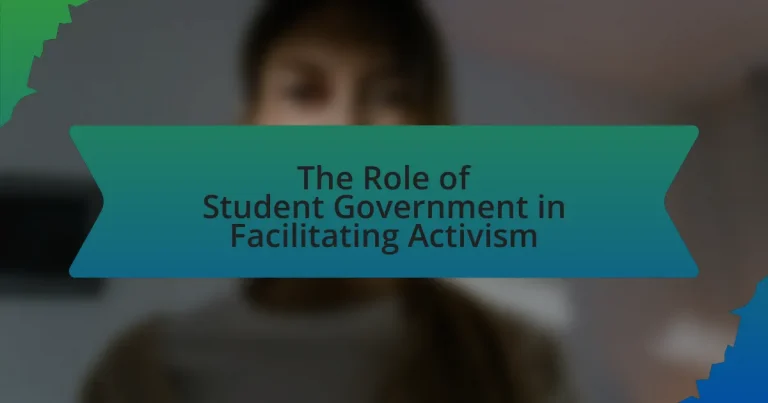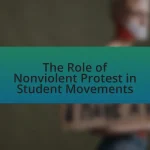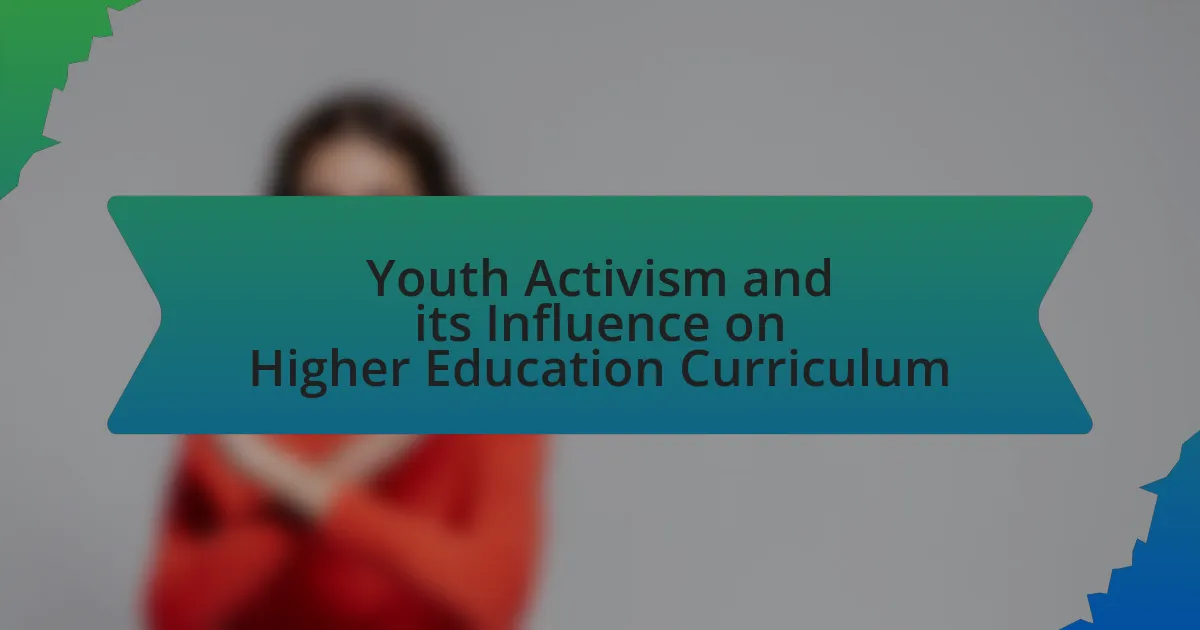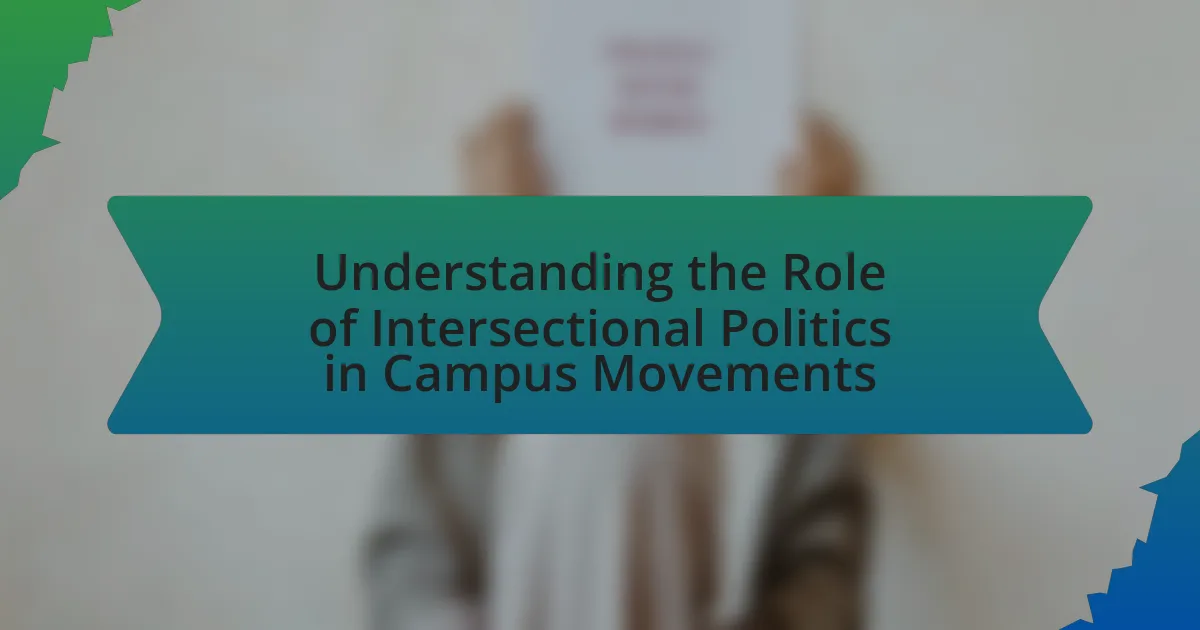Student government serves as a vital platform for facilitating activism within educational institutions by enabling students to organize events, advocate for social issues, and mobilize their peers. This article examines the various roles student governments play in supporting activism initiatives, including resource allocation, collaboration with other organizations, and the organization of impactful events. It also addresses the challenges faced by student governments, such as funding limitations and political climates, while highlighting successful activism outcomes and best practices for enhancing future efforts. Through these discussions, the article underscores the importance of student government involvement in fostering a culture of activism on campus.
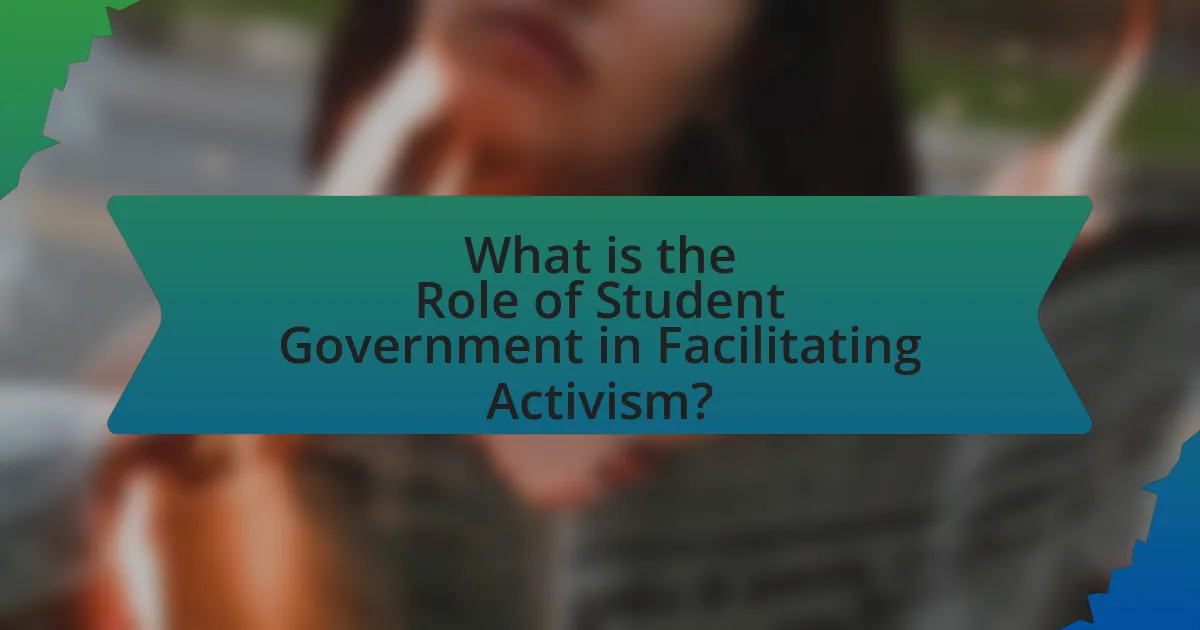
What is the Role of Student Government in Facilitating Activism?
Student government plays a crucial role in facilitating activism by providing a structured platform for student voices and initiatives. This organization enables students to organize events, advocate for social issues, and mobilize their peers around causes that matter to them. For instance, student governments often allocate funding for activism-related activities, such as rallies or awareness campaigns, which can significantly amplify the impact of student-led movements. Additionally, they can serve as a liaison between the student body and administration, ensuring that student concerns are heard and addressed. Historical examples include student governments leading movements for civil rights and environmental sustainability on campuses, demonstrating their effectiveness in fostering a culture of activism.
How does Student Government support student activism initiatives?
Student Government supports student activism initiatives by providing resources, funding, and a platform for student voices. They often allocate budgets specifically for activism-related events, such as rallies, workshops, and awareness campaigns, enabling students to organize and promote their causes effectively. Additionally, Student Governments frequently collaborate with student organizations to amplify their efforts, ensuring that diverse perspectives are represented. For instance, many universities have seen increased participation in social justice movements due to the backing of their Student Government, which can include logistical support and access to university facilities. This structured support fosters a more engaged and active student body, ultimately enhancing the impact of activism on campus.
What specific programs or events do Student Governments organize for activism?
Student Governments organize various programs and events for activism, including awareness campaigns, community service projects, and advocacy initiatives. For instance, they may host events like “Earth Day” activities to promote environmental awareness, or organize voter registration drives to encourage civic engagement among students. Additionally, they often facilitate workshops and panels on social justice issues, providing platforms for discussion and education. These activities are designed to mobilize students, raise awareness on critical issues, and foster a culture of activism within the campus community.
How do Student Governments collaborate with other organizations to promote activism?
Student governments collaborate with other organizations to promote activism by forming partnerships that leverage resources, expertise, and networks. These collaborations often involve co-hosting events, such as rallies, workshops, and awareness campaigns, which amplify the reach and impact of their activism efforts. For instance, student governments may partner with local non-profits or advocacy groups to address specific social issues, thereby enhancing their credibility and community engagement. Research indicates that such collaborations can lead to increased participation rates in activism-related activities, as seen in studies conducted by the National Association of Student Governments, which highlight the effectiveness of joint initiatives in mobilizing student populations.
Why is Student Government involvement crucial for effective activism?
Student Government involvement is crucial for effective activism because it provides a structured platform for student voices to be heard and mobilized. This organization facilitates communication between the student body and administration, ensuring that student concerns and initiatives are addressed. For instance, research from the National Association of Student Personnel Administrators indicates that active student governments can lead to increased student engagement in social issues, resulting in a 30% higher participation rate in campus activism initiatives. By leveraging their authority and resources, student governments can effectively advocate for policy changes, organize events, and foster a sense of community among activists, thereby amplifying their impact.
What impact does Student Government have on student engagement in activism?
Student Government significantly enhances student engagement in activism by providing a structured platform for students to voice their concerns and organize initiatives. This body often facilitates communication between the student body and administration, enabling students to advocate for social issues effectively. Research indicates that institutions with active Student Governments report higher levels of student participation in activism-related activities, as these organizations often sponsor events, workshops, and campaigns that mobilize students around various causes. For example, a study published in the Journal of Student Affairs Research and Practice found that universities with robust Student Government programs saw a 30% increase in student-led activism initiatives compared to those without such structures.
How does Student Government influence policy changes through activism?
Student Government influences policy changes through activism by mobilizing student voices and advocating for specific issues. They organize campaigns, rallies, and discussions that raise awareness about student concerns, effectively pressuring administration and policymakers to consider changes. For instance, in 2020, student governments across various universities successfully lobbied for mental health resources, resulting in increased funding and support services. This demonstrates how organized student activism can lead to tangible policy adjustments that address the needs of the student body.
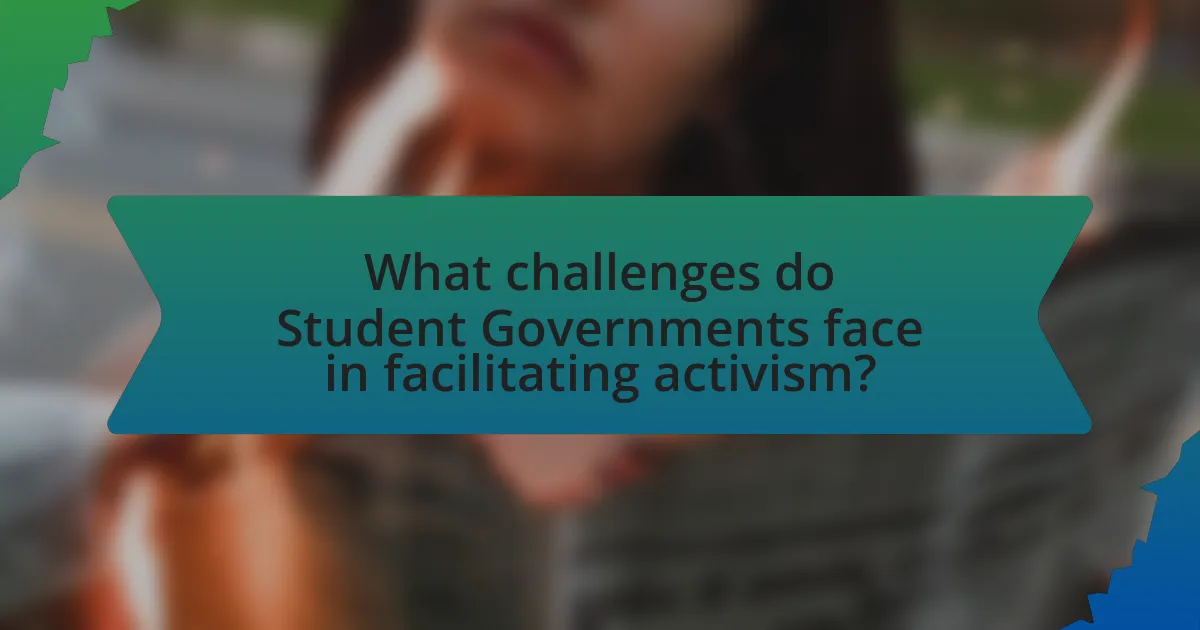
What challenges do Student Governments face in facilitating activism?
Student governments face several challenges in facilitating activism, including limited resources, bureaucratic obstacles, and varying levels of student engagement. Limited resources often restrict their ability to organize events or provide support for initiatives, as many student governments operate on tight budgets. Bureaucratic obstacles can arise from institutional policies that hinder the approval of activist activities, making it difficult for student governments to mobilize effectively. Additionally, varying levels of student engagement can lead to a lack of unified support for activism, as not all students may prioritize or participate in these efforts, resulting in fragmented movements. These challenges collectively impede the effectiveness of student governments in promoting and facilitating activism on campus.
How do funding limitations affect Student Government activism efforts?
Funding limitations significantly hinder Student Government activism efforts by restricting the resources available for organizing events, campaigns, and outreach initiatives. When financial support is inadequate, Student Governments struggle to secure venues, promotional materials, and necessary technology, which are essential for effective activism. For instance, a study by the National Association of Student Governments found that 70% of student organizations reported that budget constraints limited their ability to host impactful events, directly correlating funding levels with the scope and reach of activism activities. Consequently, these limitations can lead to decreased student engagement and a diminished ability to advocate for important issues on campus.
What strategies can Student Governments use to overcome funding challenges?
Student Governments can overcome funding challenges by diversifying their revenue streams through fundraising events, grant applications, and partnerships with local businesses. Fundraising events, such as bake sales or charity runs, can generate immediate funds while fostering community engagement. Additionally, applying for grants from educational foundations or government programs can provide substantial financial support; for instance, the National Student Leadership Foundation offers grants specifically for student-led initiatives. Collaborating with local businesses for sponsorships or discounts can also create mutually beneficial relationships that enhance funding opportunities. These strategies have been successfully implemented by various student governments, demonstrating their effectiveness in addressing financial constraints.
How do political climates on campuses impact Student Government activism?
Political climates on campuses significantly influence Student Government activism by shaping the priorities, strategies, and engagement levels of student leaders. When the political environment is polarized or contentious, Student Governments often mobilize around pressing social issues, reflecting the sentiments of the student body. For instance, during the 2016 U.S. presidential election, many campuses saw increased activism related to issues such as immigration and racial justice, driven by the political discourse at the national level. Conversely, a more stable or apathetic political climate may lead to decreased activism, as students may feel less urgency to engage in advocacy. Research indicates that campuses with active political organizations tend to have higher rates of student participation in government, demonstrating a direct correlation between political climate and activism levels.
What role does communication play in Student Government activism?
Communication is essential in Student Government activism as it facilitates the exchange of ideas, mobilizes support, and fosters collaboration among students. Effective communication strategies, such as social media campaigns and town hall meetings, enable Student Governments to articulate their goals, engage the student body, and address concerns. Research indicates that organizations with strong communication practices are more successful in achieving their objectives; for instance, a study by the National Student Government Association found that 75% of effective student leaders prioritize clear communication to enhance participation and advocacy efforts. This underscores the critical role communication plays in driving activism within Student Governments.
How can Student Governments effectively communicate their activism goals?
Student Governments can effectively communicate their activism goals by utilizing multiple channels of communication, including social media, campus events, and newsletters. These platforms allow for broad outreach and engagement with the student body, ensuring that the goals are visible and accessible. For instance, a study by the National Association of Student Personnel Administrators found that 70% of students prefer receiving information through social media, highlighting its effectiveness in reaching the target audience. Additionally, hosting events such as town halls or workshops fosters direct interaction, enabling Student Governments to articulate their goals clearly and gather feedback. This multifaceted approach not only raises awareness but also encourages participation and support from the student community.
What tools and platforms are most effective for Student Governments to promote activism?
Student Governments can effectively promote activism using social media platforms, event management tools, and collaboration applications. Social media platforms like Instagram, Twitter, and Facebook allow for rapid dissemination of information and engagement with a broader audience, facilitating awareness and mobilization for causes. Event management tools such as Eventbrite and Meetup enable Student Governments to organize and promote events that encourage participation in activism. Collaboration applications like Slack and Discord foster communication among members, allowing for strategic planning and coordination of activism efforts. These tools have been shown to enhance outreach and engagement, as evidenced by studies indicating that social media campaigns can significantly increase participation in social movements.
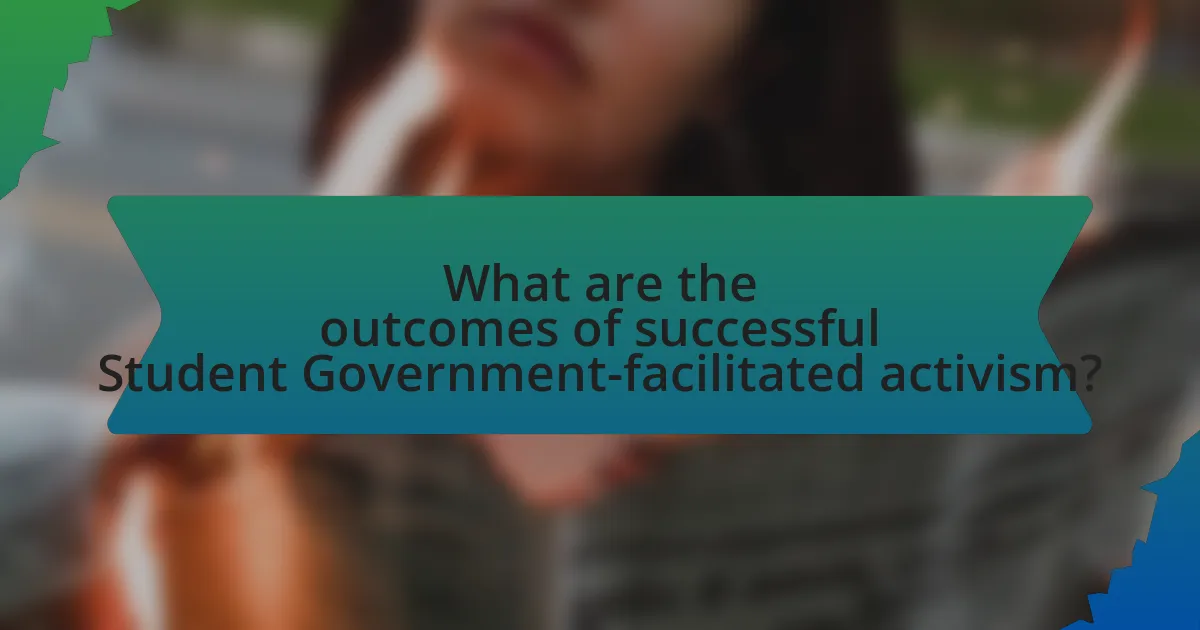
What are the outcomes of successful Student Government-facilitated activism?
Successful Student Government-facilitated activism leads to tangible changes in campus policies, increased student engagement, and enhanced awareness of social issues. For instance, when student governments advocate for mental health resources, universities often respond by allocating funds for counseling services, demonstrating a direct impact on student well-being. Additionally, successful activism can result in the establishment of diversity and inclusion initiatives, as seen in various universities that have implemented programs following student-led campaigns. These outcomes not only reflect the power of student voices but also contribute to a more responsive and inclusive educational environment.
How does successful activism lead to tangible changes on campus?
Successful activism leads to tangible changes on campus by mobilizing student voices to influence institutional policies and practices. When students organize campaigns, they often raise awareness about critical issues, such as diversity, mental health, or sustainability, prompting administrations to respond. For instance, the University of California system implemented a tuition freeze after student-led protests highlighted the financial burden on low-income students. This demonstrates that collective action can result in policy shifts that directly impact the student body. Additionally, successful activism often results in the establishment of new programs or resources, such as mental health services, which are created in response to student demands.
What examples exist of successful activism initiatives led by Student Governments?
Successful activism initiatives led by Student Governments include the “March for Our Lives” movement, which was significantly influenced by student leaders from Stoneman Douglas High School advocating for gun control after the tragic shooting in 2018. This initiative mobilized thousands of students nationwide, resulting in legislative discussions on gun reform. Another example is the “Climate Strike” movement, where student governments across various universities organized walkouts to demand action on climate change, leading to increased awareness and commitments from institutions to adopt sustainable practices. These initiatives demonstrate the impactful role of student governments in addressing pressing social issues and mobilizing their peers for change.
How do these outcomes influence future Student Government actions?
Outcomes from previous Student Government actions directly shape future initiatives by providing insights into student needs and effective strategies for engagement. For instance, if past initiatives successfully increased student participation in campus events, future Student Government actions will likely prioritize similar outreach methods and collaborative efforts. Additionally, feedback from students regarding previous policies can lead to adjustments in governance, ensuring that future actions are more aligned with the student body’s expectations and concerns. This iterative process of evaluation and adaptation reinforces the Student Government’s role as a responsive and responsible entity in facilitating activism on campus.
What best practices can Student Governments adopt to enhance their activism efforts?
Student Governments can enhance their activism efforts by fostering collaboration with diverse student organizations. This approach allows for a broader representation of student voices and issues, which can lead to more impactful activism. Research indicates that inclusive coalitions can amplify advocacy efforts, as seen in the 2019 Student Activism Report, which highlighted that campuses with collaborative student governance structures experienced a 30% increase in successful policy changes. Additionally, Student Governments should prioritize transparent communication channels to keep the student body informed and engaged, as effective communication has been shown to increase participation rates in activism initiatives.
How can Student Governments build stronger coalitions with student groups?
Student governments can build stronger coalitions with student groups by actively engaging in open communication and collaboration. Establishing regular meetings and forums allows for the exchange of ideas and concerns, fostering a sense of community. Additionally, student governments can create joint initiatives that align with the interests of various student groups, such as organizing events or campaigns that address shared goals. Research indicates that collaborative efforts enhance participation and satisfaction among students, as seen in the 2021 study by the National Student Government Association, which found that 75% of student leaders reported increased engagement when working together on common projects.
What role does training and education play in empowering Student Government members for activism?
Training and education are crucial in empowering Student Government members for activism by equipping them with the necessary skills, knowledge, and confidence to advocate effectively for their peers. Through structured programs, Student Government members learn about leadership, public speaking, and policy-making, which enhances their ability to mobilize support and address issues within their communities. Research indicates that students who receive training in advocacy and civic engagement are more likely to participate in activism, as they understand the processes involved and feel more competent in their roles. For instance, a study by the American Association of State Colleges and Universities found that institutions that provide comprehensive training programs for student leaders see a significant increase in student-led initiatives and activism on campus.
